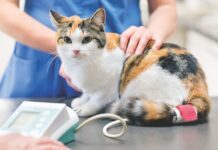Q My 12-year-old Siamese cat is a darling boy, but I have noticed that his breath has become less-than-pleasant. He seems to otherwise be in good health, but I’m worried that there is something I should be doing about this. Can you provide some advice?
A Thanks for getting in touch. I understand that halitosis, the medical term for bad breath, can be unpleasant and can cause concern for kitty’s well-being. There are a number of potential causes of halitosis, so allow me to provide a quick review of these.
Far and away, the most common cause of halitosis in cats is gingivitis, defined as inflammation (redness, swelling, pain) of the gums around the base of the teeth. Gingivitis occurs when a film (called a biofilm) accumulates on the teeth and serves as a breeding ground for bacteria, resulting in the formation of plaque. This bacteria causes the gums to become inflamed and also causes halitosis by virtue of gases that are released by these bacteria.
If unaddressed, plaque mixes with minerals in the saliva, resulting in the formation of tartar, which provides an excellent surface for even more bacteria to grow, thereby making halitosis worse. Tartar accumulation can ultimately lead to periodontitis, a condition in which the inner layers of gums and bone pull away from the teeth, forming pockets where even more bacteria can grow. If left untreated, periodontitis can lead to tooth loss.
The best way to prevent the accumulation of plaque is to brush your kitty’s teeth regularly — daily is ideal — with a toothpaste that is specially designed for cats. Human toothpaste can be toxic to cats. Go to www.partnersah.vet.cornell.edu/pet-owners/cat-teeth to watch a seven-minute video on brushing your cat’s teeth.
In some cases, halitosis may be an indication of a medical condition in parts of the body other than the mouth. Diabetic cats may develop breath that some people have described as smelling sweet, and these cats will also often demonstrate increased thirst, urination and weight loss despite having ravenous appetites. Cats with kidney disease may have breath that smells almost like urine, and these cats may also show signs of increased thirst and urination, but they will often have poor appetites.
Some cats who develop diseases of the gastrointestinal tract (i.e., blockages and cancer) may develop foul breath, often in association with loss of appetite and vomiting, and cats with liver disease may develop bad breath, loss of appetite, a swollen abdomen, yellowing of the eyes, gums and, in some cases, the skin.
It’s important to note that in most cases, halitosis is not an indication of a major medical problem. Halitosis combined with increased thirst/urination, vomiting, loss of appetite, ravenous appetite, lethargy, abdominal bloating, and/or yellowing of the gums, eyes, and/or skin, however, should be a cause for concern.
Immediate consultation with a veterinarian should be sought if any of these signs are observed. It is, of course, important to consult with your cat’s veterinarian even if you don’t notice these more concerning signs, as he/she is best equipped to help you manage this condition so that you and your kitty can live happy and healthy lives together.
Another more benign cause of intermittent halitosis in cats is the food that they eat. If your kitty just ate a bit of tuna fish or canned food with some other type of fish in it, his breath may not smell like roses for a bit afterward, but in this case, it’s a matter of individual preference. I think tuna fish and mackerel smell awesome!
I hope that this brief review is helpful, and I would suggest that you talk with your cat’s veterinarian and allow him/her to examine your baby to make sure that there is not a significant health issue as the basis of his bad breath. Probably not, if you haven’t noticed any of the other signs, but peace of mind is a wonderful thing!
—Sincerely, Elizabeth



